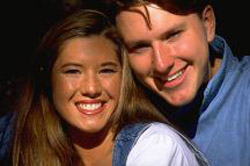A Caring, Effective Approach to Counseling
It's All About Relationships
I work with adults, adolescents, couples and families. My degree is in Marriage and Family Therapy, so I have a special expertise in relationship issues. I love working with couples, but whether there is one person or more in my office, my therapeutic approach remains the same. I believe that the quality of our lives is mostly determined by the quality of our relationships, and I endeavor to help my clients improve all the important relationships in their lives. In addition, I have found through my own experience and through my client's experiences, time and time again, when you do the right thing for your children, it turns out to be the right thing for you.
Communication is Key
Oftentimes, I find that teaching clients better communication skills, relationship enhancement tools and resolving fears can help them build better bonds and stronger attachments to loved ones. Sometimes, clients need to learn to create and maintain better boundaries, clearer rules and more consistent messages to have more equitable and loving relationships. Often, substance abuse or emotional and/or physical abuse must be dealt with before any progress can be achieved. I do not have a "one size fits all" approach to counseling. Everyone is unique and has a unique situation.
A Pragmatic Approach that Gives Results
My approach to counseling is an eclectic blend of family systems theory and cognitive behavioral theory. I believe we are interconnected to the special people in our lives, and that the greatest personal growth can be achieved in our intimate relationships. How we handle our intimate relationships reveal our inner struggles and conflicts. By examining our relationships, we can find our strengths and weaknesses, improve what is lacking and work on removing the dysfunctional thoughts and actions. We don't have control over the events in our lives OR our feelings. The only thing we can control are our actions (words and behaviors) and our thoughts. Our actions lead us to discover what our true feelings must be, and our feelings lead us to discover the thoughts we have about any particular event. Our thoughts comprise our belief system, which is the sum total of all our experiences, lessons taught us and beliefs we have developed over our life. It's really our personality, isn't it?
Counseling Tailored To Work For You
Each of us have a unique set of beliefs. No one has a perfect belief system that is always objective and correct. We all have irrational, incorrect beliefs that generate painful and distressing feelings that can cause inappropriate or dysfunctional behavior. By unwinding this sequence in therapy, we can come to examine, and therefore change and improve the automatic thoughts that occur. With more accurate and appropriate thoughts, our feelings calm down and our behavior becomes much easier to change.
Doing What's Best For YOU
I am also a strong believer in the bio-psycho-social model of human development. We live in a physical body and if we struggle with a chemical imbalance, it can make therapy and change difficult, if not impossible. I often refer clients to their physicians if I suspect they could benefit from a medication for depression or anxiety. Trying to change and improve your life with a chemical imbalance is like having one hand tied behind your back. Of course, medication isn't for everyone, and it is always your own choice to try that path.


